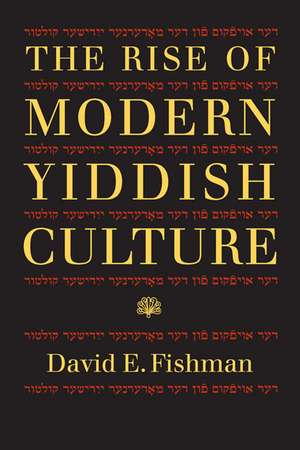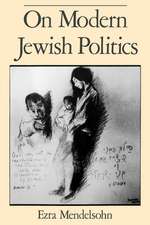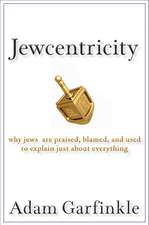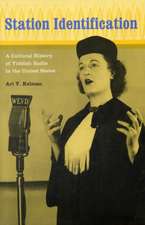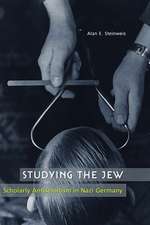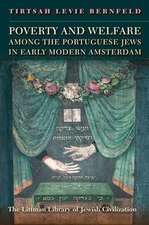The Rise of Modern Yiddish Culture: Russian and East European Studies, cartea 31
Autor David E. Fishmanen Limba Engleză Paperback – 15 feb 2010
The Rise of Modern Yiddish Culture explores the transformation of Yiddish from a low-status vernacular to the medium of a complex modern culture. David Fishman examines the efforts of east European Jews to establish their linguistic distinctiveness as part of their struggle for national survival in the diaspora. Fishman considers the roots of modern Yiddish culture in social and political conditions in Imperial Tsarist and inter-war Poland, and its relationship to Zionism and Bundism. In so doing, Fishman argues that Yiddish culture enveloped all socioeconomic classes, not just the proletarian base, and considers the emergence, at the turn of the century, of a pro-Yiddish intelligentsia and a Yiddishist movement.
As Fishman points out, the rise of Yiddishism was not without controversy. Some believed that the rise of Yiddish represented a shift away from a religious-dominated culture to a completely secular, European one; a Jewish nation held together by language, rather than by land or religious content. Others hoped that Yiddish culture would inherit the moral and national values of the Jewish religious tradition, and that to achieve this result, the Bible and Midrash would need to exist in modern Yiddish translation. Modern Yiddish culture developed in the midst of these opposing concepts.
Fishman follows the rise of the culture to its apex, the founding of the Yiddish Scientific Institute (YIVO) in Vilna in 1925, and concludes with the dramatic story of the individual efforts that preserved the books and papers of YIVO during the destruction and annihilation of World War II and in postwar Soviet Lithuania. The Rise of Modern Yiddish Culture, like those efforts, preserves the cultural heritage of east European Jews with thorough research and fresh insights.
As Fishman points out, the rise of Yiddishism was not without controversy. Some believed that the rise of Yiddish represented a shift away from a religious-dominated culture to a completely secular, European one; a Jewish nation held together by language, rather than by land or religious content. Others hoped that Yiddish culture would inherit the moral and national values of the Jewish religious tradition, and that to achieve this result, the Bible and Midrash would need to exist in modern Yiddish translation. Modern Yiddish culture developed in the midst of these opposing concepts.
Fishman follows the rise of the culture to its apex, the founding of the Yiddish Scientific Institute (YIVO) in Vilna in 1925, and concludes with the dramatic story of the individual efforts that preserved the books and papers of YIVO during the destruction and annihilation of World War II and in postwar Soviet Lithuania. The Rise of Modern Yiddish Culture, like those efforts, preserves the cultural heritage of east European Jews with thorough research and fresh insights.
Din seria Russian and East European Studies
-
 Preț: 422.97 lei
Preț: 422.97 lei -
 Preț: 332.65 lei
Preț: 332.65 lei -
 Preț: 141.48 lei
Preț: 141.48 lei -
 Preț: 428.75 lei
Preț: 428.75 lei - 15%
 Preț: 678.74 lei
Preț: 678.74 lei -
 Preț: 433.53 lei
Preț: 433.53 lei -
 Preț: 238.43 lei
Preț: 238.43 lei -
 Preț: 388.79 lei
Preț: 388.79 lei -
 Preț: 436.25 lei
Preț: 436.25 lei -
 Preț: 295.91 lei
Preț: 295.91 lei -
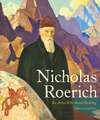 Preț: 326.41 lei
Preț: 326.41 lei -
 Preț: 127.24 lei
Preț: 127.24 lei -
 Preț: 123.55 lei
Preț: 123.55 lei -
 Preț: 315.41 lei
Preț: 315.41 lei -
 Preț: 171.58 lei
Preț: 171.58 lei -
 Preț: 485.99 lei
Preț: 485.99 lei - 15%
 Preț: 493.66 lei
Preț: 493.66 lei -
 Preț: 474.45 lei
Preț: 474.45 lei -
 Preț: 389.76 lei
Preț: 389.76 lei -
 Preț: 502.16 lei
Preț: 502.16 lei -
 Preț: 431.62 lei
Preț: 431.62 lei -
 Preț: 113.42 lei
Preț: 113.42 lei -
 Preț: 422.00 lei
Preț: 422.00 lei -
 Preț: 395.54 lei
Preț: 395.54 lei -
 Preț: 179.30 lei
Preț: 179.30 lei -
 Preț: 397.45 lei
Preț: 397.45 lei -
 Preț: 470.60 lei
Preț: 470.60 lei -
 Preț: 317.63 lei
Preț: 317.63 lei -
 Preț: 461.94 lei
Preț: 461.94 lei -
 Preț: 391.67 lei
Preț: 391.67 lei -
 Preț: 272.52 lei
Preț: 272.52 lei -
 Preț: 363.26 lei
Preț: 363.26 lei -
 Preț: 184.58 lei
Preț: 184.58 lei -
 Preț: 426.63 lei
Preț: 426.63 lei -
 Preț: 468.65 lei
Preț: 468.65 lei -
 Preț: 432.57 lei
Preț: 432.57 lei -
 Preț: 182.40 lei
Preț: 182.40 lei -
 Preț: 465.76 lei
Preț: 465.76 lei -
 Preț: 126.00 lei
Preț: 126.00 lei -
 Preț: 283.50 lei
Preț: 283.50 lei -
 Preț: 403.43 lei
Preț: 403.43 lei - 23%
 Preț: 568.69 lei
Preț: 568.69 lei - 23%
 Preț: 565.89 lei
Preț: 565.89 lei - 23%
 Preț: 556.25 lei
Preț: 556.25 lei -
 Preț: 385.91 lei
Preț: 385.91 lei -
 Preț: 422.97 lei
Preț: 422.97 lei -
 Preț: 385.53 lei
Preț: 385.53 lei -
 Preț: 423.35 lei
Preț: 423.35 lei -
 Preț: 386.88 lei
Preț: 386.88 lei -
 Preț: 426.03 lei
Preț: 426.03 lei
Preț: 348.83 lei
Nou
Puncte Express: 523
Preț estimativ în valută:
66.75€ • 69.87$ • 55.56£
66.75€ • 69.87$ • 55.56£
Carte tipărită la comandă
Livrare economică 31 martie-14 aprilie
Preluare comenzi: 021 569.72.76
Specificații
ISBN-13: 9780822960768
ISBN-10: 0822960761
Pagini: 200
Dimensiuni: 152 x 229 x 15 mm
Greutate: 0.27 kg
Ediția:1
Editura: University of Pittsburgh Press
Colecția University of Pittsburgh Press
Seria Russian and East European Studies
ISBN-10: 0822960761
Pagini: 200
Dimensiuni: 152 x 229 x 15 mm
Greutate: 0.27 kg
Ediția:1
Editura: University of Pittsburgh Press
Colecția University of Pittsburgh Press
Seria Russian and East European Studies
Recenzii
“Fishman's no-nonsense account of modern Yiddish and twentieth-century Jewish schisms . . . eschews the nostalgia and sentimentality associated with Yiddish, and gives a vivid picture of how Yiddish and Yiddish literature were promoted by even the socialist and anti-Zionist Bundists as a means of preserving Jewishness.”
—International Jerusalem Post
—International Jerusalem Post
“German, Polish and Russian . . . offered the Jews a way from isolation to assimilation, cultural as much as linguistic. These multiple associations are all incisively reconstructed and investigated in Fishman's The Rise of Modern Yiddish Culture. . . . it gives a vivid sense of a language that flourished in the first decades of the twentieth century.”
—London Review of Books
—London Review of Books
“Warmly recommended not only to students of East European Jewish history and culture but to all those interested in the ways in which language intersects with nationalism. In these matters Fishman is a most knowledgeable and reliable guide.”
—Jews in Russia and Eastern Europe
—Jews in Russia and Eastern Europe
Notă biografică
David E. Fishman is professor of Jewish history at the Jewish Theological Seminary of America in New York. He is the author of Russia’s First Modern Jews and editor of From Mesopotamia to Modernity: Ten Introductions to Jewish History and Literature.
Descriere
Acting as an important historical archive for the Jews of eastern Europe, The Rise of Modern Yiddish Culture examines the progress of Yiddish culture from its origins in Tsarist and inter-war Poland to its apex with the founding of the Yiddish Scientific Institute in 1925.
